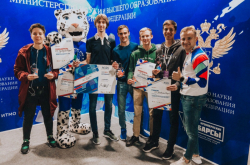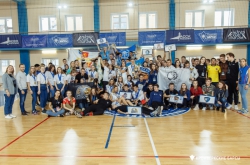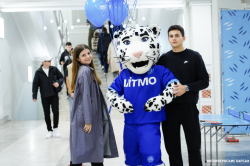The forum’s participants received training in accordance to ASSC Educational Center’s program. For one, club heads and activists of student sports leagues attended workshops on team building, individual efficiency and personal development. The students also got specific knowledge on organizing sports events. Daria Lipovetskaya, specialist of the Pastoral Department of the Russian Academy of Justice and founder of the all-Russian school of student self-governance “Leader of the 21st Century” told the forum’s participants about motivation and the principles of team building. ITMO.NEWS put down the bullet points.
-
Atmosphere of security
When you gather a team or organize a sports event, it is very important to create an atmosphere of security. Feeling of security are among the basic needs of a human. When you bring together a team, the students shouldn’t be forced into it, but join because they are feeling secure. A potential leader has to be a protector.

2. Know what your team members want
It’s important to know what your team members are interested in. There are those who like being a part of a group, that would be the majority. Usually, those are great “doers”, and these constitute about 80% of the team. Others are interested in getting a status or position. These constitute 10 to 15% of the team. There are also those who are interested in creating new things, developing the concept of events without much regard for team or status: their motivation is making achievements. Being a leader, you have to consider such things. Some tend to bear responsibility, others - don’t. A leader’s task is to know such things and use them for the benefit of the team.
3. Money is not a good motivator
If a person has good motivation, money can be detrimental to it. People who do their thing simply because they are good at it get used to financial inducement. With time, when it’s stopped for whatever reason, their inner motivation becomes insufficient for continuing to work as before. This happens in any major corporation or organization that focuses on stimulating their employees with money.

4. Communicate your values and mission
Student clubs are created by like-minded people - friends or those who share common ideas. In their development, almost every club faces the situation when its activities don’t get enough attention, and it’s hard to involve new sportsmen. Nowadays, few organizations communicate their mission and values to the public. Every organization, student sports clubs included, have to have a global mission, for example to popularize sports. Communicating it is very important, as people often come to places where they think they will find kindred spirits. If you explain the reasons for your existence, your values and mission, you can attract people whom you will like working with.
ITMO.NEWS spoke to the forum’s participants and learned what they like about sports clubs and what today’s student sports are about.

Ivan Zaharnikov, ITMO University, table tennis club
Starting with the new academic year, I’ll be training middle-level members of our club. Myself, I am part of the University team. I came to the forum because I am well acquainted with ASSC’s activities - I participated in inter-university and regional championships organized by them, and got into the national finals that took place in Anapa. I agree with many of ASSC organizers’ ideas concerning the development of student sports. I believe that it’s something our country really needs, as there is much controversy in our society, most are too concerned with politics, and sport is something that helps people relax, develops them and helps them grow stronger both physically and morally.
The main problem of today’s student sports is the lack of qualified players. Many people come to our club, but the team’s lineup is not much. When I’m speaking about the lack of qualified sportsmen, I am speaking about university teams, not sports in general; this stems from the problems of children’s sport which is quite an issue in our country: the kids don’t get the necessary skills when they are young. As a kid, I studied at a Children's and Youth Sports School of Olympic Reserve. Our senior team greatly supported the youngsters; as it was interesting for me to follow in their footsteps, I grew up a strong sportsman and became first-class.
Now, generations have changed, and those born in 2004 can no longer lead those born in 2010, as the younger generation don’t see their seniors as figures of authority, and it is the university teams that suffer the consequences. This year, we will try to change this situation. After I’ve been in our club for a year, I understood that we have to change the way it works: reorganize training sessions, solve problems of financing. I decided that I will share my experience, and my key task for the coming year is to bring up a team that will get into the top-6 at the inter-university championship.
Sportsmen should participate in forums such as this in order to fulfill their social activity, learn to organize sports events, motivate people to participate in championships, work with social networks and inspire students. It’s very important for the students to learn that there are people who are ready to help them.

Daria Zhuravleva, Baltic State Technical University, Baltic Phoenix student sports club
As of the moment, I am Chairman of the Baltic Phoenix student sports club, and I am also the incumbent chair of the Coordinators of St. Petersburg association of student sports clubs. As part of my activities, I have been to many different forums, as such events can help one improve their skills.
For example, I’ve been to ASSC’s sports festival in Anapa, to the Labour Forum, to the International Youth Forum in St. Petersburg, to the “Cherished Russia” student festival (the latter is very useful in regards to establishing contacts and getting new ideas, a lot of interesting things happen there). I came to this forum because I just got an executive position at my club, and I wanted to meet other such people, gather a team and contribute to developing sports at the regional level.
At such events, we get to know representatives of other universities and start cooperating. It is the most interested ones who gather here, and we are ready to help each other in implementing our projects. Sometimes, we also borrow others’ ideas and improve them.

Roman Jung, Baltic State Technical University, Baltic Phoenix student sports club
It’s been a year and a half since I joined the Baltic Phoenix student sports club. I focus on both the media and the organizational aspects of its work. I photograph sports events, and also film them. Apart from that, I develop the concepts of sports competitions. For instance, I organize games at the Raketa children’s camp. At the forum, I attended a workshop on motivation - as a camp counselor, I find it very important to possess the skills that would help me motivate children.

It’s also worth mentioning that the forum coincided with the opening of the official youth National Sailing League. The best participants could take express training and try out a new sport. The event kicked off in St. Petersburg on August 15.





